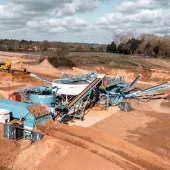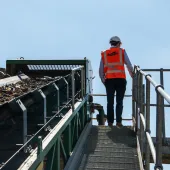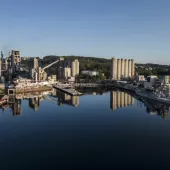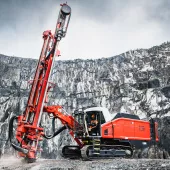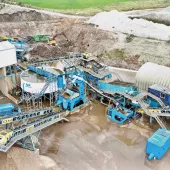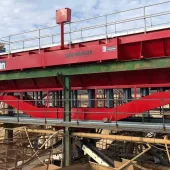CDE complete first turnkey sand washing plant in Sweden
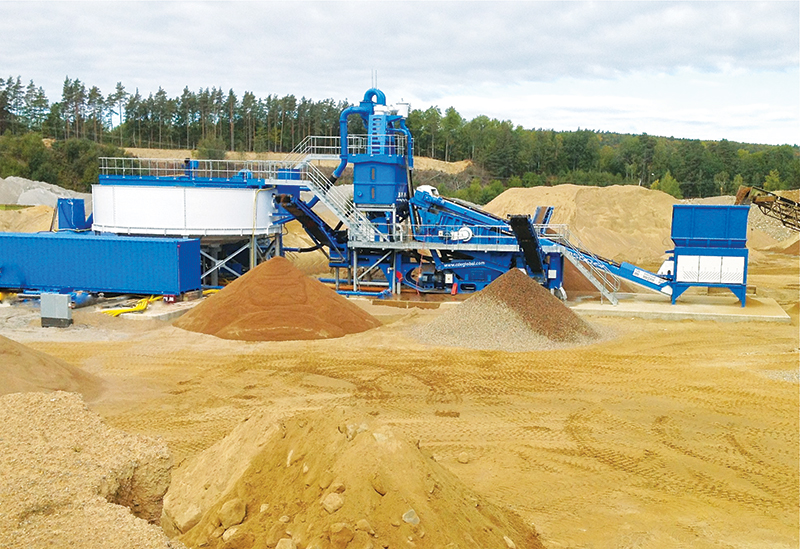
First published in the July 2014 issue of Quarry Management as Swedish Sand Success
Bröderna Björklunds Grus AB, a rock, sand and gravel quarrying company located in Olofström, southern Sweden, were founded in 1922 by the grandfather and great-grandfather of current owners Peter and Thomas Björklund. With three quarries in Marieholm, Vånga Krossen and Fjälkinge, the company’s main focus is the production of sand, gravel, crushed rock and topsoil products for a wide range of end uses. Its topsoil and natural stone products are used in many garden and landscaping projects, sands and gravels are supplied to various concrete factories in southern Sweden, and the crushed rock is used in road construction and various construction projects. The material produced by Björklunds is CE certified and meets all requirements for ballast production.
In September 2013, Northern Ireland-based CDE completed installation of a new sand and gravel washing plant at the company’s main quarry in Olofström. The turnkey plant was specially designed both to meet the company’s specific requirements and to cope with the Swedish climate. Thomas and Peter Björklund had originally purchased a CDE EvoWash in 2007 in order to capture fine sand that was being lost from an existing traditional bucket-wheel washing system. In 2013, when the decision was made to increase their washed sand and aggregate production, CDE were the natural choice to provide the solution.
‘We had previously purchased a sand washing plant from CDE which was effective at ensuring we did not lose fines material,’ said Peter Björklund. ‘We are a dynamic and specialized company and wished to increase the flexibility of the types of products we could produce so we decided to upgrade to a new CDE system. We considered several options for the new washing installation but it was CDE’s expertise, their ability to deliver a fully modular solution with the lowest cost per tonne of ownership, and fully backed performance guaranteed outputs that separated them from other providers.’
CDE were presented with a natural sand and gravel feed material containing high levels of –250µm material. Björklunds required a 200 tonnes/h plant that would produce three washed sands and two washed aggregates (a 0–0.25mm ultra-fine sand, a 0–2mm fine sand, a 2–8mm concrete sand, and 8–16mm and +16mm aggregates). Björklunds also had several other specific requirements for the project, including an option within the plant design for mixing and blending of the 0–0.25mm, 0–2mm and 2–8mm or 2–5mm sands when required. The plant also needed to be mobile so they could, potentially, move the system to any of their other quarries. It was also essential that the new plant should integrate with the existing EvoWash unit and successfully operate in the extremely cold temperatures experienced in Sweden. These factors, and analysis of the material at the quarry, dictated that CDE design a bespoke solution for Björklunds.
Following a sieve analysis at Olofström Quarry, the CDE equipment specified for this project comprised an M2500 E4X mobile washing plant with integrated counter-flow classification unit (CFCU), due to the high volumes of –250µm sand, and an AquaCycle A600 thickener. The AquaCycle was required to ensure the correct amount of water was supplied, as on-site water is limited, and to condense the waste sludge into a high-concentration slurry. Also, these products would successfully integrate with the site’s existing EvoWash 71 fines-recovery system, allowing the system to output five fractions in real time, under computer-controlled classification. In addition, due to the project location and specific requirements for mixing the two sands, the plant would have two new and unique features that were being tried for the first time by CDE: this would be the first project in which a dual sand conveyor with a diverter system would be used and it would also be the first time a ‘winter pack’ glycol system would be utilized to combat frost.
The process
Raw feed is delivered to the M2500 E4X via an integrated 20-tonne capacity S20 hopper. The material travels up the feed conveyor which is equipped with a belt weigher to allow Björklunds to quickly and easily monitor the flow of material through the plant while also having real-time access to operating capacity information. The belt weigher is an enhancement package under CDE PlantPlus, which allows existing customers to add enhancements to their plant after purchase.
Material then enters the ProGrade screen which is fitted with18 non-bolted Isenmann modular polyurethane panels. The +16mm material is removed on the top deck and stockpiled using the first of the M2500 unit’s four conveyors. The bottom deck of the ProGrade is a split screen where the first part has smaller apertures that allow the 0–2mm material to pass through, whilst further down the deck larger apertures allow the 2–8mm or 2–5mm material to pass through. The remaining 8–16mm is removed on the bottom deck.
The EvoScreen dewatering screen on the integrated EvoWash sand washing plant is a split dewatering screen that allows two sand sizes to be dewatered at once, and the 2–8mm or 2–5mm material is transferred, via jet pump, to one side of this screen. Design engineer’s at CDE introduced an innovative concept to meet with Björklunds’ requirement for mixing their 0–2mm and 2–8mm or 2–5mm sands when required. This is a dual sand conveyor with a diverter system that allows the conveyors to be moved hydraulically to match the mats in the dewatering screen. The chassis of the machine has been redesigned so that it has two supporting legs at each side rather than one central leg, which stabilizes the plant in order to perform the conveyor adjustment. This special feature has since been introduced as a permanent design enhancement as a result of its success on this Swedish project.
After dewatering on the EvoScreen, the 2–8mm material is stockpiled via the third M2500 conveyor. Meanwhile, a sand pump transfers the 0–2mm material to the next stage of processing, the CFCU. The counter-flow classification unit uses upward flow classification to separate particles by density and eliminates any oversize particles from the final sand product. The CFCU operates successfully in this project due to the inclusion of a glycol system – a first for CDE. Glycol was used in place of air to ensure maximum uptime in the coldest conditions and is necessary due to the extreme temperatures experienced during the winter in Sweden. The glycol acts as antifreeze and ensures that the pinch valves, which are used to discharge the fine material from the CFCU tank, can open and close successfully despite the cold temperatures.
The 0–2mm material is sent to the second half of the EvoWash dewatering screen for stockpiling via the fourth conveyor on the M2500. The CFCU overflow contains 0–0.250mm material which still contains valuable product and is, therefore, transferred to the next stage of processing, the CDE EvoWash 71. Here the material enters the EvoWash sump before being pumped to the hydrocyclones where a fine 0.063–0.250µm sand is dewatered and stockpiled via a fifth conveyor.
The fine material removed in the CFCU through the two 500mm hydrocyclones is sent to the AquaCycle A600 thickener, along with the 0.063µm material from the EvoWash hydrocyclones. The AquaCycle thickener recovers up to 90% of the water used in the plant and complies with ever-increasing environmental requirements from planning authorities.
Peter Bjorklund commented: ‘Our company prides itself on using the best technology in its operations and avoiding anything that may be harmful to the environment. The AquaCycle ensures we have a clean, safe and efficient site at all times as a result of reduced waste water management requirements.’
Eoin Heron, senior sales manager for CDE in Europe, added: ‘The AquaCycle significantly reduces the sludge basin requirement, saving Bjorklunds significant excavation costs while ensuring minimal environmental impact. This leads to many advantages, especially with planning requirements.’
In addition, Björklunds invested in CDE preventative maintenance inspections (PMI) which, according to Mr Heron, are proven to have a positive impact on plant production levels. ‘The CDE performance guarantees ensure that the customer has visibility of expenditure through a fixed-cost agreement and our regular PMI inspections guarantee maximum efficiency and productivity,’ he explained.
‘Investment in a CDE PMI package means CDE expert technicians will visit a customer’s site an agreed number of times every year, which can easily be continued as a regular contract. These specialist engineers provide support and guidance to our customers and a detailed understanding of how the plant is performing to help them to maintain plant performance at the optimum level and achieve high-quality end products.’
The new plant has now been operating successfully since September 2013 and Mr Bjorklund is confident that he made the right decision in choosing a CDE solution. ‘The sand plant means that we can maximize our customer base and offer our products for specialized applications, such as golf sands and playground sands. The plant is extremely flexible and we can control the mixtures to achieve the optimum screening curves for customers. This is very important, especially for the concrete and dry-mix industry, which needs an optimum screen curve to keep costs down and maintain constant product quality.
‘And as discussed at the outset of the project, the plant can also be relocated to another quarry with ease, which will allow us to keep producing sand and gravel for a long time to come.’
- Subscribe to Quarry Management, the monthly journal for the mineral products industry, to read articles before they appear on Agg-Net

